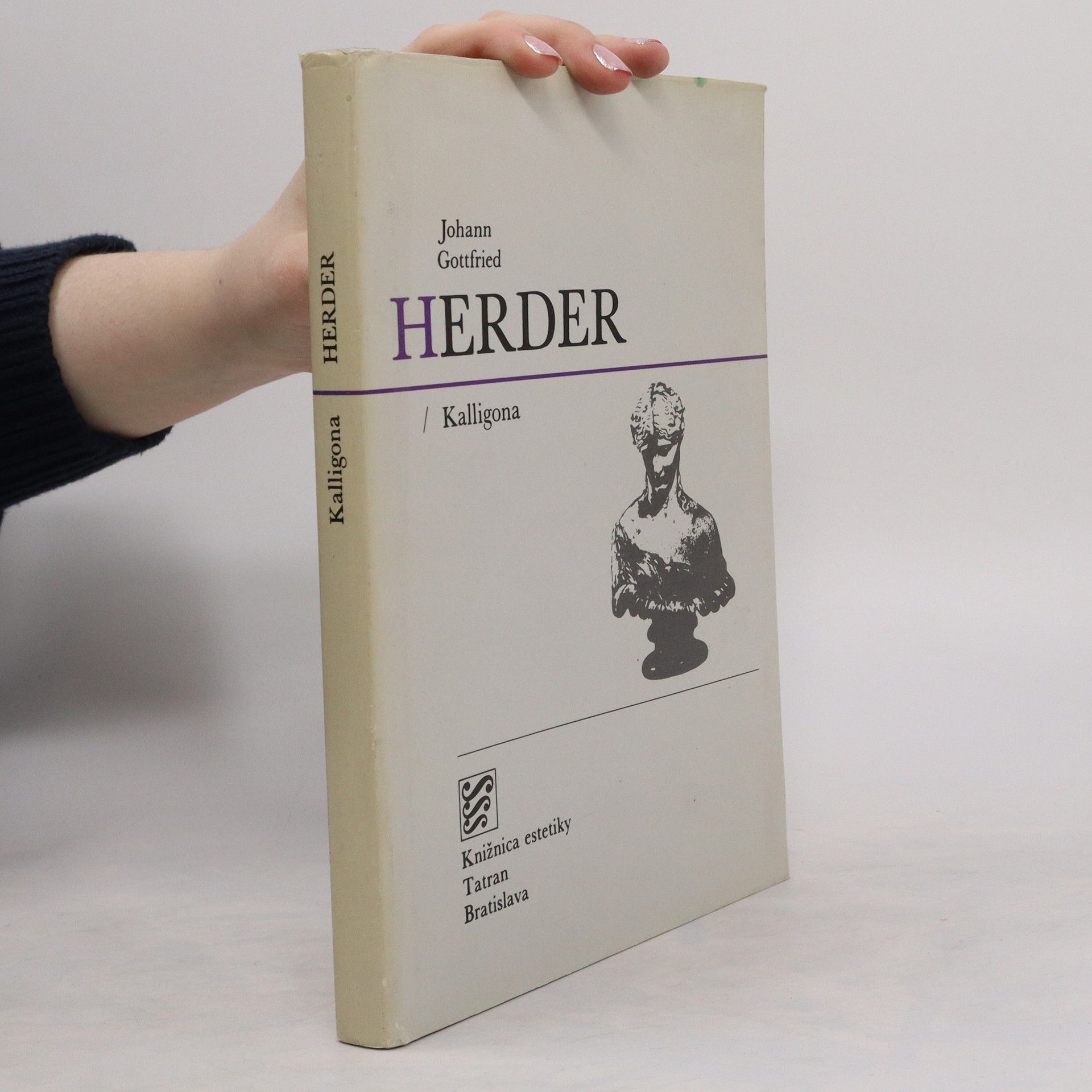Johann Gottfried von Herder Knihy
Johann Gottfried Herder bol nemecký filozof, teológ, básnik a literárny kritik, spájaný s obdobiami osvietenstva, Sturm und Drang a Výmarskej klasiky. V roku 1772 publikoval 'Pojednanie o pôvode jazyka', čím ďalej rozvinul svoje presadzovanie jazyka nad rámec predchádzajúcich výziev. Herder týmto dielom položil základy komparatívnej filológie a prepojil ich s novými politickými prúdmi, čím zdôraznil zásadný vplyv jazyka na formovanie národnej identity a myslenia.







Ve výboru z všestranné tvorby německého polyhistora 18. století, přítele i soka Goetha a Schillerova, Johanna Gottlieba Herdera, má český čtenář poprvé příležitost seznámit se s autorovými úvahami o jazyce, literatuře a dějinách od antiky po přítomnost.
Listy na podporu humanity
- 267 stránok
- 10 hodin čítania
Význačný německý osvícenský filozof definuje základní principy humanity, jež ztělesňuje nejvyšší poslání člověka.
Metakritika ke Kritice čistého rozumu
- 364 stránok
- 13 hodin čítania
Metakritika ke Kritice čistého rozumu je jedním z posledních, největších, a zároveň nejméně známých Herderových filosofických spisů. Představuje nejen nejostřejší dobovou reakci na hlavní dílo Immanuela Kanta, který byl nejprve Herderovým učitelem, nýbrž i jednu z nejzralejších sebereflexí Herderovy vlastní filosofie a filosofie německého osvícenství vůbec. V polemice s Kantem hájí některá základní paradigmata leibnizovského racionalismu a jejich konformitu se zjeveným náboženstvím. V kritické a idealistické filosofii konce 18. století naopak vidí systematickou destrukci křesťanského metafyzického myšlení a proti jejímu apriorismu a formalismu koncipuje vlastní plnohodnotnou alternativu novověké filosofie, založenou na kvalitativním a vývojovém pojetí daností lidského myšlení i bytí.
Shakespeare
- 128 stránok
- 5 hodin čítania
The work explores Johann Gottfried Herder's profound impact on literary criticism, particularly regarding Shakespeare. Herder's 1773 essay introduced a historicist perspective, advocating for the evaluation of cultural artifacts based on their historical and cultural contexts rather than rigid classical standards. By challenging the dominance of French neoclassicism and rejecting Enlightenment ideals, Herder's insights marked a shift towards Romanticism and laid the groundwork for modern aesthetic appreciation, reshaping our understanding of literature and art.
Das essayistische Werk zur deutschen Literatur in 4 Bänden
- 998 stránok
- 35 hodin čítania
Bd. 1. Barthold Heinrich Brockes, Johann Gottfried Schnabel, Friedrich Gottlieb Klopstock, Christoph Martin Wieland, Johann Gottfried Herder, Johann Karl WezelBd. 2. Johannes von Müller, Karl Philipp Moritz, August Heinrich Julius Lafontaine, Wilhelm Friedrich von Meyern, Ludwig TieckBd. 3. Samuel Chriistian Pape, Friedrich de la Motte Fouqué, Leopold Schefer, Carl Spindler, Adalbert StifterBd. 4. Karl Ferdinand Gutzkow, Heinrich Albert Oppermann, Theodor Fontane, Karl May, Paul Scheerbart, Gustav Frenssen, Gottfried Benn, Ernst Kreuder, Rudolf Krämer-Badoni, Alfred Andersch, Arno Schmidt.
Die Briefe gewähren einen umfassenden Einblick in das Leben und den geistigen Werdegang Herders, seine Beziehungen zu bedeutenden Zeitgenossen und seine Anstrengungen zur Klärung theologischer, philosophischer, literarischer und historischer Fragen. Die Briefe sind in chronologischer Reihenfolge geordnet. Die Apparate enthalten die Angaben zur Überlieferungsgeschichte, zur Datierung, zu Gegenbriefen, zu Bezügen verschiedenster Art, zur Handschrift, zu bereits vorhandenen Drucken und zur Textkritik. Ein Registerband mit ausführlichen Erläuterungen der Namen und Orte bietet auch die Auflösung der zahlreichen Buchtitel.
Italienische Reise
- 739 stránok
- 26 hodin čítania
Ein reich kommentiertes klassisches Zeugnis einer kritischen und illusionslosen ›Italienischen Reise‹, authentisch und intim dokumentiert in Briefen und Tagebuchaufzeichnungen 1788 -1789. Knapp zwei Monate nach der Rückkehr Goethes aus Rom brach dessen älterer Freund Johann Gottfried Herder im August 1788 nach Italien auf. Er fand allerdings weder Goethes »Arkadien« noch die persönliche Bereicherung, die er erhofft hatte, vielmehr erfuhr er sich als Nordländer, dem die unbeschwerte Sinnlichkeit des Südens für immer fremd blieb. Seine fast einjährige ›Italienische Reise‹ wird damit zum klassischen Beispiel einer kritischen, illusionslosen Italienerfahrung. Gerade weil Herder im Gegensatz zu Goethe und Seume seine Reise nicht in einer eigenständigen Beschreibung festhielt, entsteht in der Zusammenschau von Tagebuch, Notizen und Briefwechsel – mit Frau Caroline und den Kindern, mit dem Herzogshof in Weimar und Freunden und Bekannten - , eine eindringliche und unstilisierte Darstellung. Kein Italienerlebnis eines Deutschen ist in ähnlich intimer und authentischer Weise dokumentiert. Zum 200. Todestag von Johann Gottfried Herder am 18.12.2003 erscheint diese seit langem vergriffene Originalausgabe erneut bei dtv: ein reich kommentiertes klassisches Zeugnis einer kritischen und illusionslosen ›Italienischen Reise‹, authentisch und intim dokumentiert in Briefen und Tagebuchaufzeichnungen 1788 -1789.
Die Briefe gewähren einen umfassenden Einblick in das Leben und den geistigen Werdegang Herders, seine Beziehungen zu bedeutenden Zeitgenossen und seine Anstrengungen zur Klärung theologischer, philosophischer, literarischer und historischer Fragen. Die Briefe sind in chronologischer Reihenfolge geordnet. Die Apparate enthalten die Angaben zur Überlieferungsgeschichte, zur Datierung, zu Gegenbriefen, zu Bezügen verschiedenster Art, zur Handschrift, zu bereits vorhandenen Drucken und zur Textkritik. Ein Registerband mit ausführlichen Erläuterungen der Namen und Orte bietet auch die Auflösung der zahlreichen Buchtitel.


